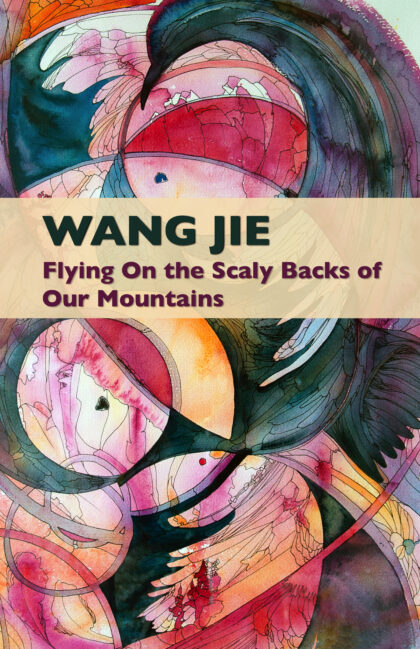(Frequently Asked Questions, in Order of Frequency, or Lack There of)
10. I’m interested in your symphonies. Who publishes your work?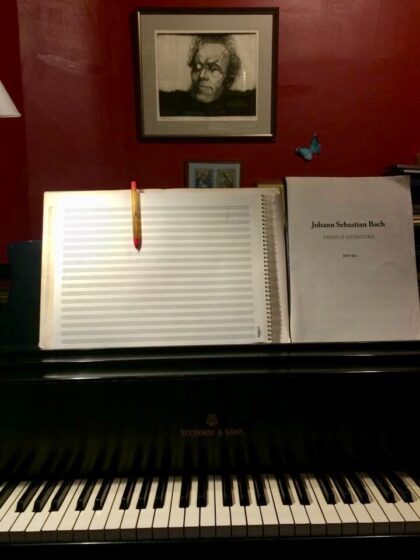
9. What’s your rule of thumb as a composer?
8. What is new music? Why is it so difficult?
Going to a concert with new music on the program is only difficult because you care. I’ve lost count of the people who tell me: just give me Beethoven and Mozart and call it a day! It’s difficult like meeting your co-worker’s new baby for the first time is difficult. This is truly difficult because the meeting is produced by everybody’s best effort in a situation no one has any control whatsoever. A world premiere means the composer is meeting her newborn for the first time. If the composer is well taught, she knows, as far as the art form is concerned, her entire life span is a work-in-progress. If one is not only well taught but somehow gets to be a good composer, good like Don DeLillo is a good writer, here’s how Don describes a work-in-progress:
“……a kind of hideously damaged infant that forever crawling after the writer, dragging itself across the floor of restaurants where the writer’s trying to eat, appearing at the foot of the bed first thing in the morning, hideously defective, hydrocephalic and noseless and flapper-armed and incontinent and retarded and dribbling cerebo-spinal fluid out of its mouth as it mewls and blurbles and cries out to the writer, wanting love, wanting the very thing its hideousness guarantees it’ll get: the writer’s complete attention.”
Awwwwww, how precious! You say to your co-worker. Knowing full well, this is definitely not baby Jesus.
It’s not as simple as running an honest business. There are lots of feelings, ambitions, good faith, bad taste, broken marriages, camaraderie, smelly feet, fennel seeds, all sausaged together. What’s the flavor of the month? Onto the next link. Pray for a sighting of baby Jesus.
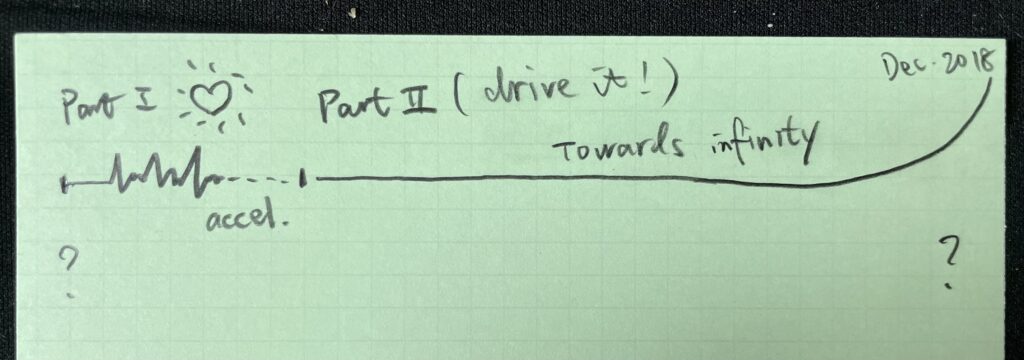
7. Why don’t you write Chinese music? Aren’t you betraying your heritage?
Funny you should ask. Pierre Boulez asked me the same question. I don’t write Chinese music but I can teach you how to do it.
6. What does it feel like to be a woman composer?
One time, I got frustrated. If I could pee while standing, I would turn and turn and make a big circle. One day, the circle will be big enough that my studio can accommodate an industrial printer capable of keeping up with the speed of my writing.
5. How come your symphony has no words? Why is it so elusive?
First of all, don’t get fooled by the Intro to Music textbook: music is not a language. Music doesn’t come with words. Music is symbol. Music is pure feeling in vibration. That’s why it’s universal. It can behave like a language because all languages are a sub-category of symbolic expression. Pure music, a.k.a. absolute music, abstract music, symphonies, sonatas, music without words, music with a pretentious title, is fiction. Unlike a novelist, composers must crawl out of the comfort of languages to achieve the absolute freedom only possible in pure music. That means no grammar, no dictionary. Since recent decades, not even an agreed upon knowledge of what constitutes music.
It’s elusive for the same reason feelings, emotions, truth and beauty are resistant to captivation by words. We have an English word like “energy,” a Sanskrit word like “Spanda (divine vibration),” a Chinese word like “Qi,” to describe the thing that defines the living. But what does energy feel like? We stand a chance to experience pure feelings when our bodies are held by vibrations that is pure music. It’s the kind of intimacy that erases time, like touching the palm of a long-lost parent, like sitting beside an ancient campfire and telling your Neanderthal friends about your Tinder date last Friday. It’s the only confirmation you need to know that you are alive.
A symphony is a work of fiction. I’m not good at convincing you global warming is real accompanied by a background of musicians. Ad agencies do that. Sometimes I open my mouth to say something and I sound like a preacher. I hate that about myself but I haven’t figured out how to survive the language zone. I’m not interested in expressing how humans have failed each other in the cruelest way. I’m not unaffected by the empty glance from a hungry child at refugee camps or another cheerful face of a young composer in my studio, chaperoned by a deceased alcoholic parent. Both break my heart. I compose everyday because I want to show you how, even for 15 minutes, all this suffering is worth it when you vibe with my symphony. I am at my best when words stay as far away as possible without disappearing. I’m probably out of my mind but that’s my truth. I think that’s the most honorable thing a composer can do and that’s what I have sworn to do.
4. Does classical music still matter today?
The mature works in classical music reminds us that we are not alone in our unutterable feelings, these clusters of inner stuff without names, and that we are valued for having them and loved for feeling this way. Classical music matters even more today because it’s more accessible than ever.
3. Who’s your favorite composer?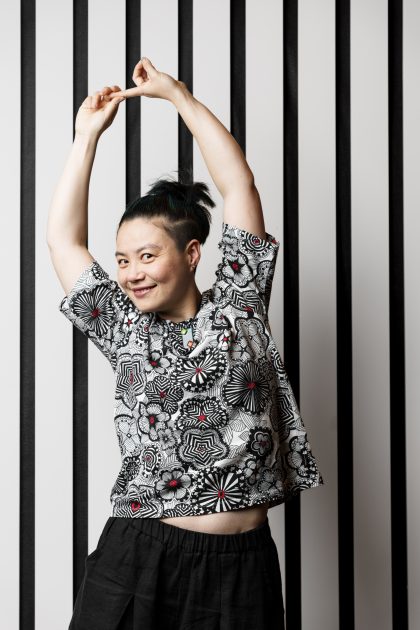
I love when people ask me what I like. Their enthusiasm about classical music makes me feel important. I don’t love what I say to them. But I respect them too much to say anything less true.
There are people’s composers and there are composers’ composers. They occasionally overlap. I’ve been a child of this art form my whole life and I still can’t listen well without the context that is me. I’m a practitioner. I spend all my waking hours in music, even when I’m not creating it. Unless I know you really well, which is to say that I somehow know myself very well, I can’t begin to guess what’s more important to you — my opinion or yours. It’s entirely possible that Mahler’s Titan Symphony, his first, is the revelation you’ve been waiting for your whole life. It would be unkind for me to tell you that I seldom think about the Titan. I hate to be the reason people feel hopeless. But not one day has gone by that I’m not humbled by the fact Mahler’s tenth symphony is his tenth, and here I’m barely getting through my third.
The truth is composers fail listeners as often as listeners fail composers. I can’t tell you how many times I’ve prayed for an attendee at my world premiere, to just walk over and say something like “I get it. It’s honest work. When can I hear it again?” I am far from the first artist to lead the backstage tour that the greatest among us have known all along, and this is Zadie Smith: this matter of understanding-that-which-is-outside-of-ourselves using only what we have inside ourselves amount to some of the hardest intellectual and emotional work you’ll ever do. I don’t have time to think about composers. I’d be amazed if there are composers who think about me, other than my students, the day before their lessons. Who we are is not nearly as interesting as what we have done with our experiences. I have a relationship with the works, and whatever a relationship entails. Shakespeare, for example, didn’t give away anything about Shakespeare the person.
I’ve been listening for four decades. Sometimes I listen to the same piece a few years apart. Every repeated listening teaches me something about myself. Very rarely, but it does happen, I find myself revisiting a piece and a voice out of nowhere goes “aha, that’s what you’ve been missing this whole time!” It’s as if I’ve discovered my best friend’s secret. The same thing would happen a few years later with the same piece. It feels like my heroes from the past are saying, with a wink and nod, you’re one of us.
2. How did you become a composer?
How I became a composer is terribly unromantic. I once had a crush on a concert pianist. For a few years, a concert pianist was all I wanted to become. I practiced 6 hours a day. I was not bad but I wasn’t good enough to have a career. Meanwhile, one of my first attempts at composition won me a top prize at the Shanghai Conservatory. It was an assignment and I didn’t even try very hard. At some point, I took a cold look at the facts: I’ve got a real shot at composing. I’m good at it. Over the years, what became more interesting to me is how I remained a composer.
If you are bored reading this F.A.Q., google “wang jie love at fifth sight.” The essay is subtitled “On Becoming a Composer.” You’ll see a picture of my cute little dog, among other things.
1. Rumor has it that you read medical journals in order to chill.
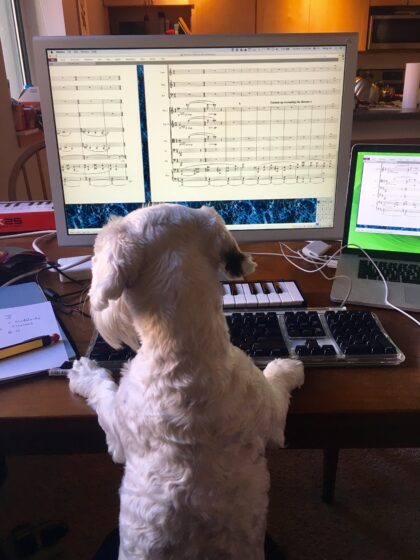
The Best-dog-ever-Sealyham-Terrier-composer-assistant, Pilot Wang
Why are you a composer then?
Busted. Reading about pathology is my guilty pleasure. I’m fascinated by the rapidly intense, or the slow drip of chronic disease state where two or more elements battle it out on the cellular level. Cells and their friends, imagine if they had faces.
On a related note, our lives are defined by the people who loved us and people who failed to love us. Sometimes that’s the same person and I’m cross-eyed just thinking about it. My parents came to mind. Ever since I had them, my world is divided into the good people who practice music (my dad) and the bad people who teach (my mom). Look at me: I spend my life composing and teaching.
I don’t know that I’ll ever become good at teaching. I know I’m good at composing. Sometimes I think I can teach better if I were less lazy. Because I spend a lot of the afternoons leafing through pictures of enormous tumors, and thinking about what I want for dinner.
0. Why are you obsessed with mechanical keyboards that flash rainbows with LED lights?
Because I feel very Gen-Z when I type on these keyboards. Gen-Z is our last hope for classical music. I desperately want to contribute to their cause.
Submit your questions here. Watch it answered. Maybe.

